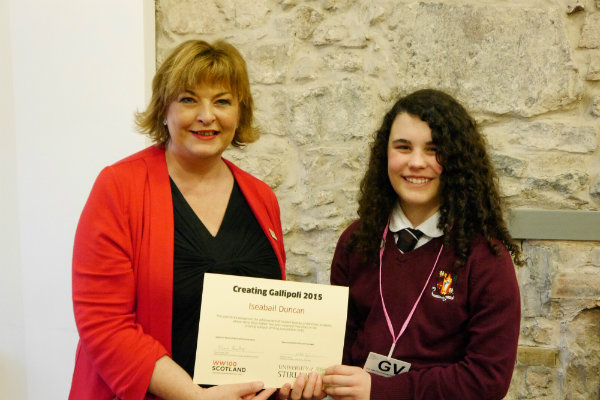
Winners of the University of Stirling’s national creative writing competition, commemorating the 100-year anniversary of the First World War Battle of Gallipoli, have been announced and were awarded certificates at a special ceremony at Holyrood this week.
‘Creating Gallipoli. Connecting Scotland’s diverse communities through creative writing’ was launched as part a joint campaign with the Scottish Government Commemorations Panel to remember the Battle. The creative writing competition coincided with 100 years from the day the 52nd (Lowland) Infantry Division arrived in Gallipoli, having conducted their training in the City. Secondary school pupils across Scotland were encouraged to submit a poem or short story that recreated a scene from the Gallipoli campaign.
The judging panel comprised acclaimed poet Professor Kathleen Jamie, military historian, Trevor Royle, and Professor Holger Nehring, Head of History and Politics at the University of Stirling.
The winner for best short story was Isabeail Duncan from Banchory Academy for ‘Dear Father.’
Iseabail Duncan, said: “I am incredibly delighted to have had my story chosen as the winner of Creating Gallipolli 2015. I found it fascinating to be able to look back in time, past the statistics, to see how war affects each person as an individual.”
Adam Duncan from Shawlands Academy won best poem for ‘Slaughter at Gallipoli’.
Adam Duncan said: “Before the competition, I did not know about Gallipoli but it was so interesting and sad and I found it fascinating. Some things just amazed me like when we picked up bags full of books to feel how heavy a soldier’s kit was. I really enjoyed writing the poem and trying to include all the things we had been taught. I never expected to win but feel honoured that my poem was considered good enough to be part of the centenary celebrations and to remember all the men who lost their lives in the campaign.”
Professor Holger Nehring, Head of History and Politics at the University of Stirling, said:
“Congratulations to the winners for their excellent short story and poem. The University was honoured to be involved in organising the commemorative campaign together with the Scottish Government, and it was truly moving to read how Scottish pupils today brought the suffering and experiences of both British and Turkish soldiers to life.”
“The competition attracted more than 300 entries from 25 secondary schools all over Scotland. It helped to raise awareness in schools of the impact of the First World War, which probably claimed the lives of more than 100,000 Scots and left many more injured or disabled.”
Ms Fiona Hyslop MSP, Cabinet Secretary for Culture, Europe and External Affairs, presented the winners with certificates and a book voucher at a special ceremony at Holyrood on Thursday 25 February.
Ms Hyslop said:
“The ‘Creating Gallipoli’ Creative Writing Competition provided pupils with an opportunity to consider how troops must have felt when they arrived in Gallipoli one hundred years ago. Expressing those feelings as a poem or short story will have added to their understanding of the horrors of that particular campaign and of war in general.
“The winning entries are extremely moving and excellent pieces of writing and I have no doubt that the winners, and all those who took part, will have gained a greater understanding of the sacrifices made by so many. I was very impressed and affected by the winners writing.
“This, and future generations, should be aware of the enormous impact that the First World War had and how that is still being felt today. I congratulate the University of Stirling and the many entrants for the success of this competition.”
Media enquiries to Rachel MacBeath, Communications Officer on 01786 467 760 or r.a.macbeath@stir.ac.uk
Notes for editors
- Background information
The University and Stirling Council organised events last year (4-6 June) as part the national commemorations marking the Battle. The events coincided with 100 years from the day the 52nd (Lowland) Infantry Division arrived in Gallipoli, having conducted their training in the City. The Battle of Gallipoli, also known as the Dardanelles Campaign, lasted eight months and saw the Allied Powers attempt to control the sea route from Europe to Russia.
